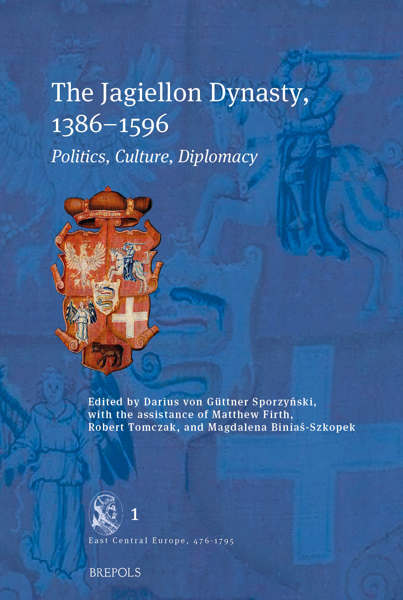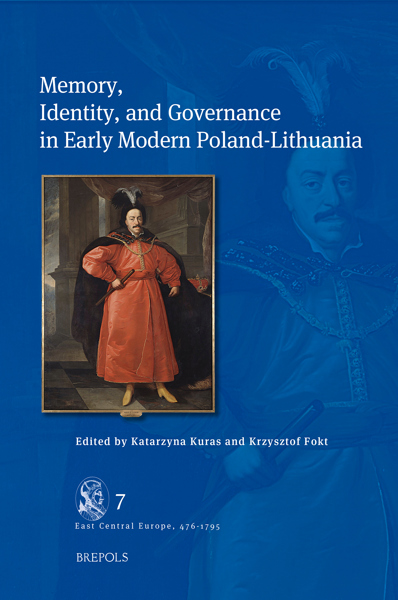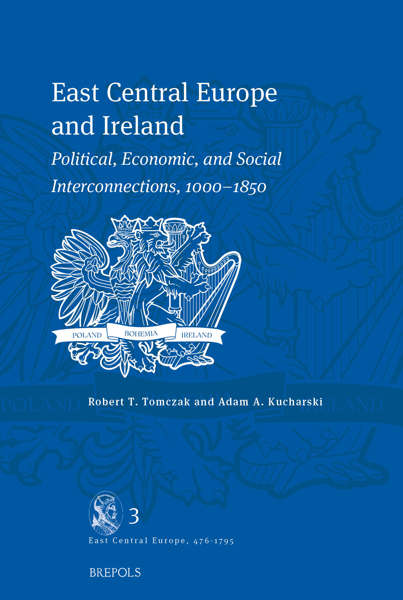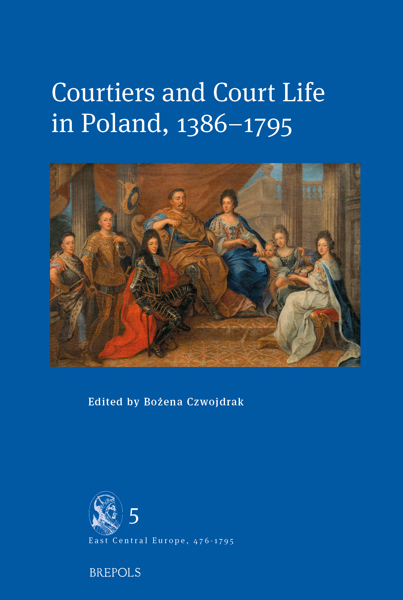
Memory, Identity, and Governance in Early Modern Poland-Lithuania
Katarzyna Kuras, Krzysztof Fokt (eds)
- Pages: 528 p.
- Size:156 x 234 mm
- Illustrations:17 b/w, 8 col., 5 maps b/w
- Language(s):English
- Publication Year:2025
- € 125,00 EXCL. VAT RETAIL PRICE
- ISBN: 978-2-503-61936-1
- Hardback
- Available
- € 125,00 EXCL. VAT RETAIL PRICE
- ISBN: 978-2-503-61947-7
- E-book
- Available
Discover how the people of Poland–Lithuania transformed their heritage into a dynamic force, shaping their multicultural society and envisioning a future rooted in a richly layered past.
Katarzyna Kuras (Jagiellonian University) researches the history of the Polish-Lithuanian Commonwealth under the Wettin Dynasty, focusing on client networks, patronage, and the influence of magnate courts on politics and culture.
Krzysztof Fokt (Jagiellonian University) specialises in history of governance and settlement of East-Central Europe (especially Poland, Silesia and Upper Lusatia) in the Middle Ages and the Early Modern Period
.
In the early modern period, Poland–Lithuania stood as a realm where the echoes of a storied past intertwined with the ambitions of a dynamic present. This volume illuminates how its diverse populace navigated the complexities of their shared heritage, weaving tradition with innovation to craft a uniquely multi-layered identity. The essays presented here examine the dual nature of historical inheritance in this vast polity. On the one hand, the past served as a treasure trove of enduring ideas, compelling narratives, and time-tested practices that enriched cultural and political life. On the other, it posed formidable challenges, requiring creative adaptation to meet the demands of changing times. By exploring established narratives, performative traditions, and historical frameworks, the contributors uncover the intricate ways in which memory influenced decision-making and societal evolution. They reveal how the past was neither static nor simply an obstacle, but was an active force that shaped contemporary aspirations and inspired visions of the future. Through the lenses of rulers, nobles, intellectuals, and commoners, this collection offers fresh perspectives on how the people of Poland–Lithuania harnessed the power of history to craft a legacy that transcended their era. Essential reading for scholars and enthusiasts alike, this work examines the enduring dialogue between memory and identity in one of Europe’s most compelling early modern states.
The Composite Nature of Poland-Lithuania: Political, Cultural, and Social Dynamics in Early Modern East Central Europe
Katarzyna Kuras and Krzysztof Fokt
Part I. The Glorious Past in the Collective Memory and Political Practice
Chapter 1. Between Myth and History: The Sarmatian Narrative of Poland-Lithuania
Joanna Orzeł
Chapter 2. Voices on an Extinct Dynasty: The Jagiellons in the Political Writings of the First Interregnum
Marek Ferenc
Chapter 3. A Phronetic Journey Through Poland’s Memorial Landscape
Iwona Barwicka-Tylek
Part II. Legacies and Identities of the Regions and Provinces and their Developments
Chapter 4. The Transformation of Legacy: How the Ukrainian Cossacks Adapted the Traditions of Rus’ and Poland-Lithuania
Viktor Brekhunenko
Chapter 5. Cultural and Political Dualities: Livonia’s Integration and Identity within Poland-Lithuania
Bogusław Dybaś
Chapter 6: Lithuanian Sejmiks: Defending Lithuanian Independence and Equality with Poland, 1697–1763
Andrei Matsuk
Part III. The History and Memory of Institutions
Chapter 7. The Liberum Veto and the Parliamentary System of Poland-Lithuania: Historiography’s Struggles with a Challenging Legal Legacy
Tomasz Kucharski
Chapter 8. Local Governance and Civic Engagement: The Role of Sejmiks in Poland-Lithuania
Michał Zwierzykowski
Chapter 9. The Seventeenth-Century Wars in Polish Historical Consciousness: Myths, Realities, and Legacies
Zbigniew Hundert
Part IV. The Res Publicae of the Commoners: Memory, Social Practice, and Cohesion in the Towns and Villages
Chapter 10. The Heritage of Everyday Life: Legal Culture in the Towns and Cities of Early Modern Poland
Maciej Mikuła
Chapter 11. Local Heritage: The Sources of Identity of the Peasantry and Petty Townsfolk in pre-Partition Poland-Lithuania
Mateusz Wyżga
Part V. Cultural Practices and Their Developments: Communication, Education, Healthcare
Chapter 12. Domestic and Foreign Travels of Inhabitants of Poland-Lithuania as Forms of Exploring and Preserving Cultural Heritage and Elements of Social Communication
Adam Kucharski
Chapter 13. Balancing Tradition and Influence: Noblewomen in the Social Fabric of Early Modern Poland
Agnieszka Jakuboszczak
Chapter 14. Health, Illness, and Medical Treatments in Early Modern Poland-Lithuania
Katarzyna Pękacka-Falkowska and Jakub Węglorz
Part VI. Intact Deposits of Faith? Religious Developments in Poland-Lithuania
Chapter 15. Confessional Divisions and the Evolution of Worship in Royal Prussia
Sławomir Kościelak
Chapter 16. Holiday Customs and Catholic Reformers in Eighteenth-Century Poland-Lithuania: The Story of Religious Heritage Resilience
Stanisław Witecki
Glossary of Offices
Index




